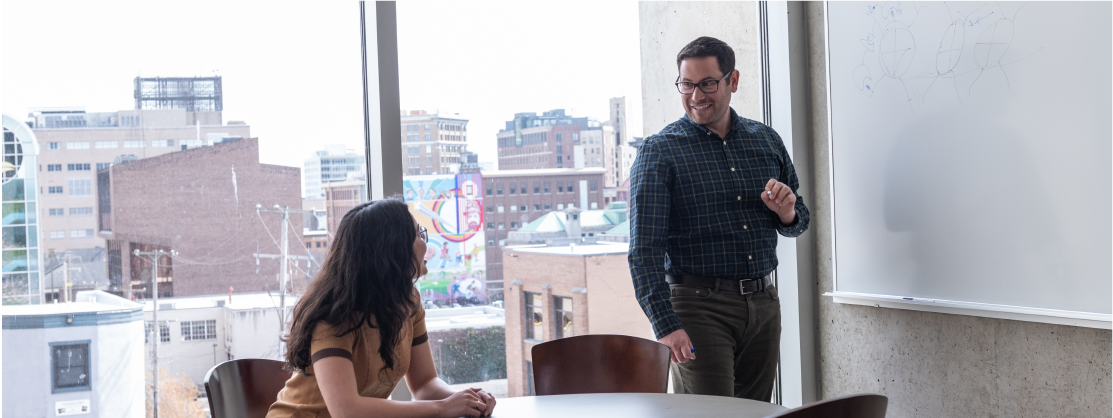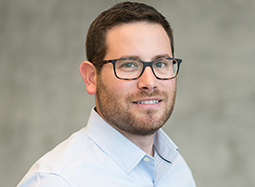Meet the scientist behind the science: Dr. Scott Rothbart
October 19, 2021

Earlier today, we announced that Van Andel Institute Associate Professor Dr. Scott Rothbart has been awarded a Research Scholar Grant from the American Cancer Society. The award will support research into mechanisms that power a promising new class of anti-cancer drugs.
VAI Voice caught up with Dr. Rothbart to discuss his new project, his scientific journey and the importance of mentorship.
Tell us about the research project funded by the American Cancer Society.

Dr. Rothbart: My lab studies a set of control switches that help tell our genes when they should be on and when they should off. These “epigenetic” switches play major roles in human development, and faulty switches play causal and reinforcing roles in diseases such as cancer.
For this project, we want to map the precise locations of these switches inside the cell, and we want to better understand which switches are faulty in cancer. Our studies will focus on one type of switch called methylation, which is the target of a promising new class of anticancer drugs called EZH2 inhibitors.
At the molecular level, EZH2 is an enzyme that methylates other proteins. EZH2-dependent methylation of proteins that are tightly associated with our genes has been long-studied for its role in switching genes on and off. This project will consider the extent to which proteins loosely associated with our genes are targets of EZH2, and whether disrupting EZH2 activity toward these loosely associated proteins contributes to the anti-cancer properties of EZH2 inhibitors.
A Research Scholar Grant from the American Cancer Society will support this exciting project and help reveal new insights that we hope will lead to improved cancer treatments.
Notably, my first independent research grant was a postdoctoral fellowship award through the American Cancer Society. It really helped catalyze my research and career — I’m very grateful for their support then and now.
Why did you become a scientist?
Dr. Rothbart: Science and writing were my two favorite subjects in grade school. Growing up, the way I appreciated the application of science was through medicine, and I thought I would become a medical doctor. My sophomore year of college, I took summer classes at New York University. Through a family friend, I was fortunate to join a lab at NYU Medical Center as an undergraduate research intern. That was a life-changing moment.
This immersive biomedical science research experience had me hooked. Before this experience, I knew little about how scientists do what they do. It’s sounds silly now, but I didn’t really appreciate at the time that I could make an impact in biomedical research and that there was a profession out there where I could wake up in the morning with an (sometimes crazy) idea and go to work to test it. I also realized that there is a lot of writing involved in science. I thought, “This is great! I can pursue this career where I can make scientific discoveries and write all about them.”
This “foot-in-the-door” experience that I had as an undergrad has left a lasting impression on me. I try to pay it forward now that I have my own lab by hosting undergraduate summer interns with the hope that I can provide them with that same “aha” moment that I had back at NYU.
(Interested in an undergraduate research internship at VAI? Learn more here.)
How did mentorship shape your path and your mentorship style?
Dr. Rothbart: My experience as a postdoctoral fellow really shaped the way I think about science, design projects and even how I mentor trainees in my lab. In many ways, my mentorship style is a mix of all the good things I’ve learned from my undergrad, graduate and postdoc mentors.
For example, my graduate and postdoc mentors gave me a good degree of freedom in the lab, which forced me to think independently. I struggled a bit with this early on in my Ph.D., but I think it ultimately helped me become a better scientist and gave me a lot of confidence to lead.
My style is similar in that I don’t micromanage my trainees, but I do ensure that I keep up with people in the lab. One way I do this is through weekly one-on-one meetings. That time is dedicated to the trainee. We talk about experimental progress and plans, big-picture ideas, future directions, and the nuts and bolts of projects. These discussions are a great opportunity to set short- and long-term goals, reset if needed and keep our eyes on the prize. My goal is to support trainees while also building their confidence and empowering them.
What are some things trainees can do to prepare for careers as independent scientists?
Dr. Rothbart: For me, it goes back to writing. I encourage trainees to write as often as possible — applications for fellowships, manuscript drafts, and so on. As a Ph.D. student, I remember being thrown into the process of manuscript preparation — my advisor and I would end up with 40 to 50 drafts going back and forth. There’s a lot of growth and development that comes from being actively involved in the writing process.
As a postdoc, I realized that strong writing skills are key for punching your ticket to the next level as an independent researcher. Writing successful grant applications is an important skill set, not only because it helps secure research funding but because it forces you to really think about the project design and the specific aims, and articulate those ideas clearly to readers. Additionally, the grants I was able to attain as a trainee, such as the American Cancer Society fellowship, were a springboard for my career.
Scott B. Rothbart, Ph.D., is supported by a Research Scholar Grant, RSG-21-031-01-DMC, from the American Cancer Society.
